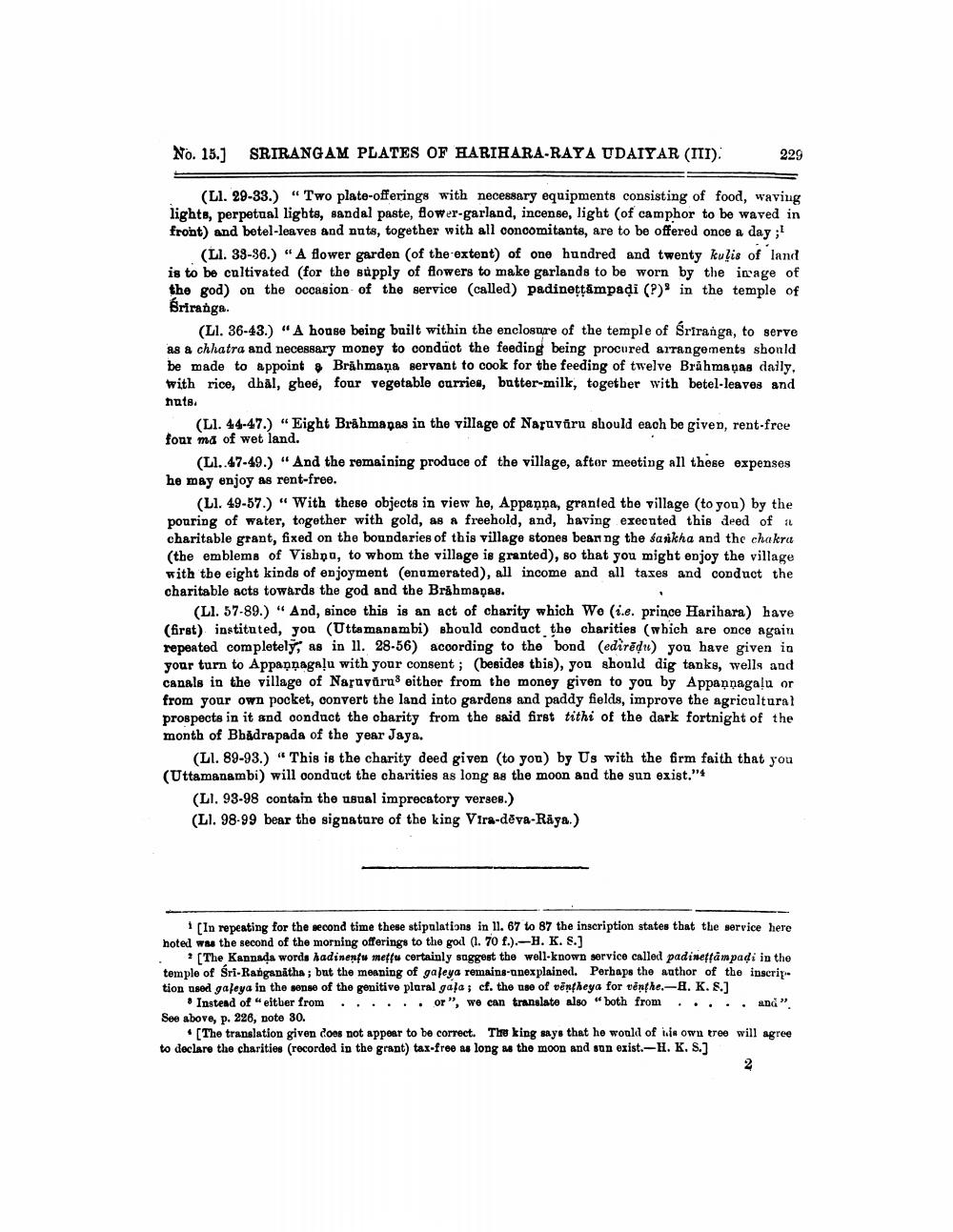________________
No. 15.] SRIRANGAM PLATES OF HARIHARA-RAYA UDAIYAR (III).
229
(LI. 29-33.) "Two plate-offerings with necessary equipments consisting of food, waving lights, perpetual lights, sandal paste, flower-garland, incense, light (of camphor to be waved in front) and betel-leaves and nats, together with all concomitants, are to be offered once a day ;'
(Ll. 33-36.) "A flower garden (of the extent) of one hundred and twenty kuļis of land is to be cultivated (for the supply of flowers to make garlands to be worn by the image of the god) on the occasion of the service (called) padinettampadi (?) in the temple of Briranga.
(LI. 36-43.) "A house being built within the enclosure of the temple of Sriranga, to serve as & chhatra and necessary money to condäct the feeding being procured arrangements shonld be made to appoint Brāhmaṇa servant to cook for the feeding of twelve Brāhmaṇas daily. with rice, dbal, ghee, four vegetable curries, butter-milk, together with betel-leaves and huts.
(Ll. 44-47.) "Eight Brahmapas in the village of Naraviru should each be given, rent-free four ma of wet land.
(LI. 47-49.) "And the remaining produce of the village, aftor meeting all these expenses he may enjoy as rent-free.
(LI. 49-57.) “ With these objects in view he, Appanna, granted the village (to yon) by the pouring of water, together with gold, as a freehold, and, having executed this deed of a charitable grant, fixed on the boundaries of this village stones bean ng the sarkha and the chakra (the emblems of Vishna, to whom the village is granted), so that you might enjoy the village with the eight kinds of enjoyment (enumerated), all income and all taxes and conduct the charitable acts towards the god and the Brahmanas.
(Ll. 57-89.) " And, since this is an act of charity which We (i.e. prince Harihara) have (first) instituted, you (Uttamanambi) should conduct the charities (which are once again repeated completely, as in 11. 28-56) according to the bond (edirēdu) you have given in your turn to Appannagaļu with your consent ; (besides this), you should dig tanks, wells and canals in the village of Naravärns either from the money given to you by Appaạnagalu or from your own pocket, convert the land into gardens and paddy fields, improve the agricultural prospects in it and conduct the charity from the said first tithi of the dark fortnight of the month of Bhadrapada of the year Jaya.
(LI. 89-93.) « This is the charity deed given to you) by Us with the firm faith that you (Uttamanambi) will conduct the charities as long as the moon and the sun exist."
(LI. 93-98 contain the usual imprecatory verses.) (LI. 98-99 bear the signature of the king Vira-deva-Raya.)
In repeating for the second time these stipulations in 11. 67 to 87 the inscription states that the service here noted was the second of the morning offerings to the god (1. 70 f.).-H. K. S.] . ? [The Kannada words hadinentu metu certainly suggest the well-known service called padinettampadi in the temple of Sri-Ranganatha; but the meaning of galeya remains-anexplained. Perhaps the author of the inscription used galeya in the sense of the genitive plural gala; cf. the use of ventheya for venthe.-A.K.S.)
Instead of "eitber from ...... or ", we can translate also "both from ... .. and”. See above, p. 226, note 30.
[The translation given does not appear to be correct. The king says that he would of te own tree will agree to declare the charities (recorded in the grant) tax-free as long as the moon and sun exist.-H. K. S.]




